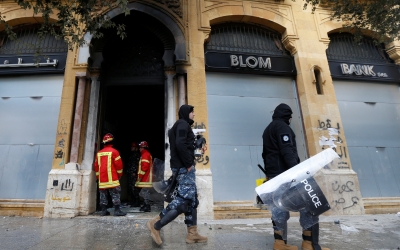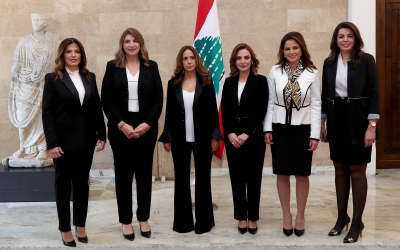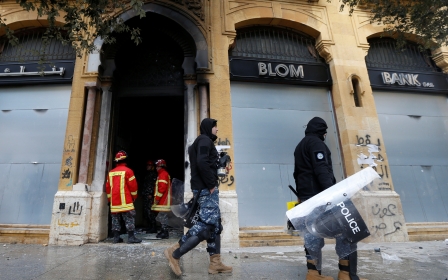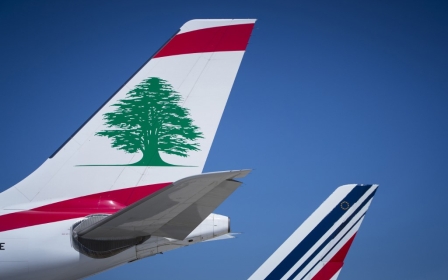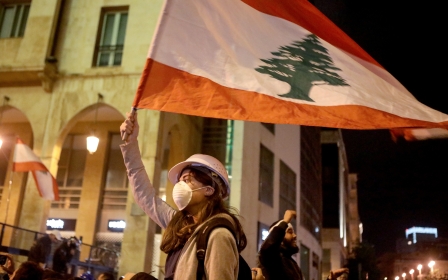'Mistakes of the past': Lebanon PM says country must default on its debt

Lebanon Prime Minister Hasan Diab announced on Saturday that the country can no longer pay its debts and that they must be restructured.
"How can we pay the lenders when Lebanese people can't withdraw funds from their banks?" Diab said in a news conference, adding that defaulting and restructuring debt was the only "path".
He added: "The loans are larger than Lebanon can handle... Can a nation be free if it is drowning in debt?"
The former university professor blasted Lebanon's financial and monetary policies of past decades.
"We are today paying the price of mistakes of past years," he said. "The entire Lebanese economy is prisoner to these policies."
He also slammed the banks, saying that Lebanon "does not need a banking sector four times the size of [its] economy."
Earlier this week, state media and judicial sources announced that Lebanon's financial prosecutor had frozen the assets of 20 Lebanese banks, their top bosses and board members, but the decision was reversed the same day.
Protests erupted in several locations across Lebanon following the prime minister's speech, including in Tripoli, Zouk Mosbeh, Zahle and Tyre.
Protesters told local media they fear the government imposing further regressive taxation that may harm individual Lebanese, rather than focusing on reclaiming looted public funds and expanding social services. They also renewed calls for early parliamentary elections.
Default was inevitable
Diab, since his appointment last December, has been tasked with pulling Lebanon from the mire, and has promised to bring economic reforms and development to the ailing country.
He vowed to end wasteful spending and to implement a transparent three-stage economic bailout plan to solve the debt crisis and make Lebanon's economy productive once again.
Mohamad Faour, a post-doctoral research fellow in banking and finance at University College Dublin, told Middle East Eye that Lebanon defaulting on its debt was inevitable.
"Default would [eventually] have become a mathematical reality," Faour told MEE, adding that Lebanon would have had to exhaust the last of its reserves to pay its debts.
A cabinet meeting earlier on Saturday voted unanimously to not pay a maturing 9 March $1.2bn Eurobond. Diab also met with President Michel Aoun, Speaker Nabih Berri, Central Bank Governer Riad Saleme and the head of the Association of Banks in Lebanon.
Aoun said after the meeting that they would back any decision Diab's government makes, with the exception of paying the debt on time.
Lebanon has been going through its worst economic crisis since its 15-year-long civil war. It also has one of the highest debt-to-GDP ratios in the world, which Diab said had reached about 170 percent.
Dollar shortages that led to banks' withdrawal limits and price hikes eventually sparked a popular uprising last October. Since then, the Lebanese lira has significantly devalued, reaching 2,700 to the US dollar, despite an official peg at 1507.
Greece example
Credit rating agencies including Fitch have long anticipated Lebanon defaulting on its debts.
The International Monetary Fund announced last month that the Lebanese government had contacted them for non-binding technical advice on the economic setbacks and its forthcoming debts.
Still, until recently, the Association of Banks in Lebanon has been insistent on the country paying its debts as scheduled.
Unlike the country's commercial banks, many politicians have not resisted the idea of debt restructuring or default. Free Patriotic Movement MP Alain Aoun, a senior member of the party, called in a tweet for the development of a bailout plan "just as a Greece did".
A senior banking and finance lawyer in Lebanon, speaking on the condition of anonymity, told MEE they welcomed Diab's calls to restructure the banking sector and protect small depositors.
Fewer banks
"We should end up with fewer banks, a major state stake (at least in the immediate future) in the reformed banks and a different business model than the current failed one," they told MEE.
Diab's government won parliament's vote of confidence in February when he introduced his three-stage economic recovery plan to be implemented over the next three years.
Cash-strapped Lebanon has also been scrambling to implement reforms that would unlock a pledged $11.1bn in loans promised by the international community in 2018 for development projects.
In addition, the IMF issued a report on Lebanon last October following an audit, calling for price increases in electricity bills and gasoline and a value-added tax hike from 11 percent to as much as 20 percent, among other economic reforms.
Diab's three-stage plan does not stray far away from these recommendations.
Middle East Eye delivers independent and unrivalled coverage and analysis of the Middle East, North Africa and beyond. To learn more about republishing this content and the associated fees, please fill out this form. More about MEE can be found here.


